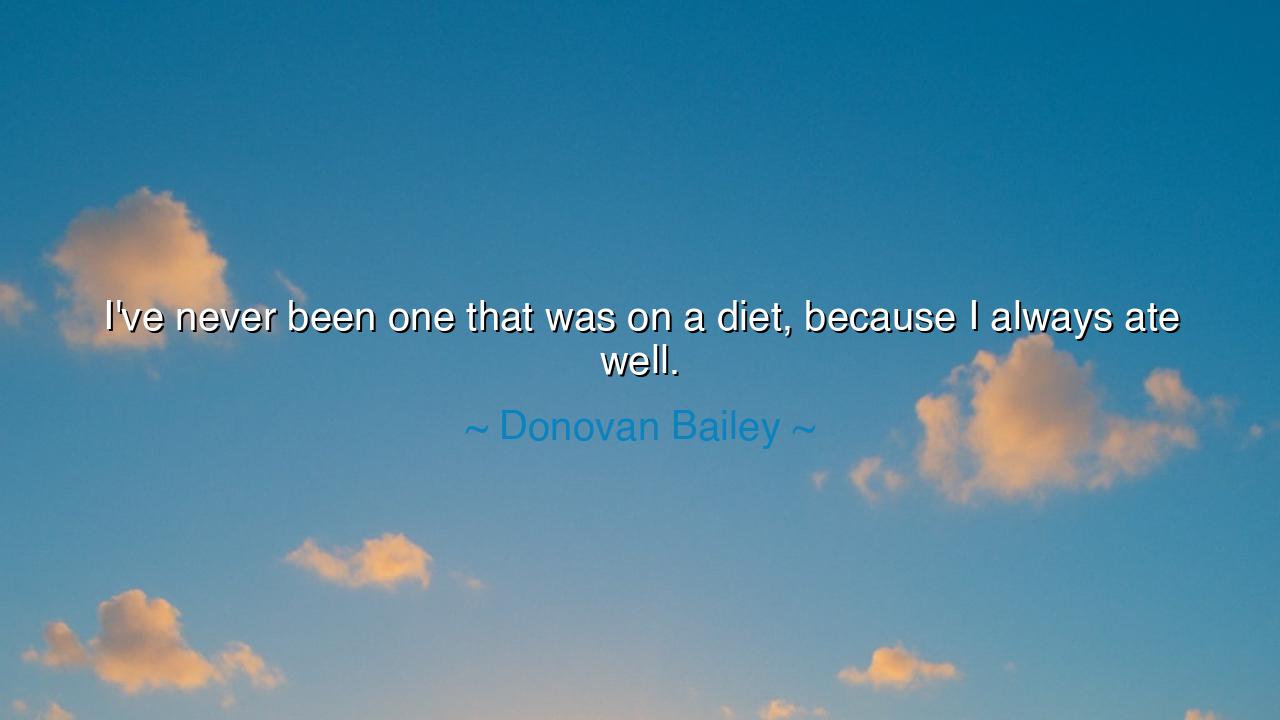
I've never been one that was on a diet, because I always ate






When Donovan Bailey, the great sprinter and Olympic champion, said, “I’ve never been one that was on a diet, because I always ate well,” he was not merely speaking of food — he was speaking of discipline, balance, and the art of living in harmony with one’s purpose. His words, though simple, carry the weight of a philosophy as old as civilization itself: that the body is not to be ruled by extremes, but guided by wisdom. For the man who understands what is good for him does not need the chains of a diet; he walks freely in the path of self-mastery.
The origin of this truth lies in Bailey’s life as an athlete — a man whose every breath, every heartbeat, was devoted to the pursuit of perfection. To run as he did, to be crowned the fastest man in the world, demanded not only physical power but also harmony between mind, body, and spirit. Yet Bailey understood what many forget: that true discipline is not forced; it is cultivated. To “eat well,” in his sense, means to live in awareness — to know what fuels strength, what nurtures recovery, what honors the temple of the body. He needed no diet because his choices were already aligned with his goal. The law of moderation, that ancient virtue, guided him more faithfully than any written rule.
The wise of the past would have called this the way of temperance. In the temples of Greece, the athletes of Olympia trained under a sacred code: they did not starve themselves, nor indulge without thought. They ate simply — grains, olives, fish, fruit — not to satisfy craving, but to sustain endurance. They knew that the man who governs his desires need not be governed by commandments. Like Bailey, they lived in the quiet rhythm of order, not in the chaos of obsession. For those who “eat well” are those who have learned to listen — to the body’s need, to nature’s abundance, to the wisdom of restraint.
In our modern age, this lesson has been forgotten. The world worships diets like false gods — low-carb, high-protein, sugar-free, fat-free — each promising salvation, yet each built upon anxiety. People count calories but not blessings; they measure portions but not gratitude. And so, they live in conflict with the very thing meant to nourish them. Donovan Bailey’s words cut through this noise with the calm of an elder’s counsel: the one who lives rightly does not need to repent. If you eat with understanding, if you live with intention, the body itself becomes your guide. The diet becomes unnecessary because discipline has become nature.
Consider the story of Miyamoto Musashi, the legendary samurai of Japan. Though a warrior, his wisdom stretched beyond the sword. In his later years, he wrote The Book of Five Rings, where he taught that the way to mastery is found in simplicity. Musashi lived on a modest diet of rice, vegetables, and tea, refusing luxury. “When one knows sufficiency,” he wrote, “the spirit becomes light.” In this, he mirrors Bailey’s truth — that greatness is sustained not by deprivation, but by balance. The one who “eats well” is the one who eats with awareness, neither enslaved by appetite nor tormented by denial.
Bailey’s statement also speaks of self-trust — a virtue the ancients revered. He trusted his instincts, his experience, his body’s wisdom. He did not need a plan imposed from without, because he lived by a compass within. This is the mark of maturity: to move from rule to intuition, from compulsion to choice. It is the same journey every seeker of mastery must walk — the transition from discipline to harmony, from training to being. The student first obeys, but the master simply lives.
And so, let this be the lesson drawn from his words: do not live by diets; live by discernment. Eat in a way that honors your purpose. Let your food be clean, your habits steady, your joy unforced. Seek balance, not extremes; wholeness, not obsession. The goal is not to diet, but to live in such wisdom that diet is no longer needed. When your choices spring from clarity and peace, health follows as naturally as breath.
For in the end, Donovan Bailey’s truth is the same truth the ancients taught beneath olive trees and temple walls: those who live rightly have no need for rules, and those who nourish themselves with mindfulness are already walking the path to greatness. To “eat well” is not merely to feed the body — it is to honor life itself.






AAdministratorAdministrator
Welcome, honored guests. Please leave a comment, we will respond soon